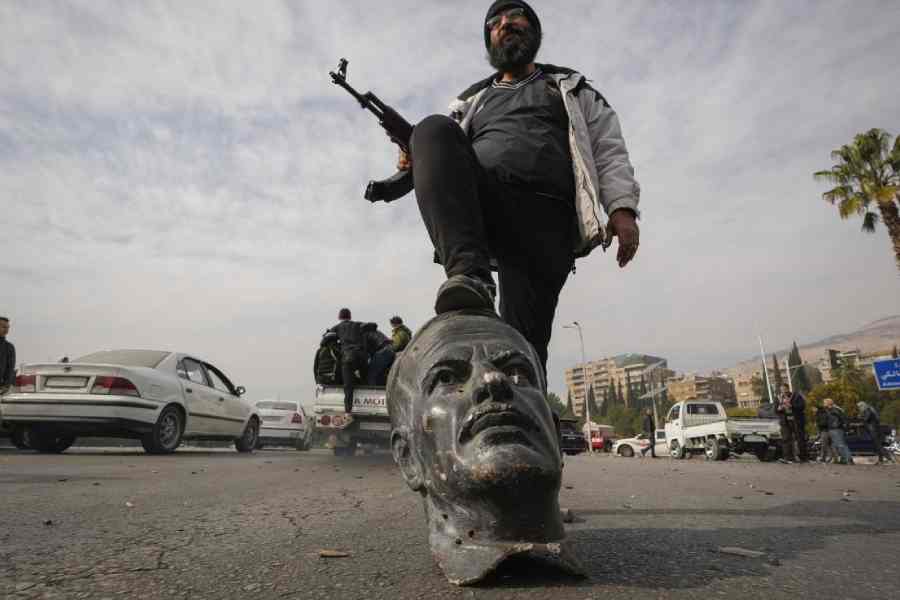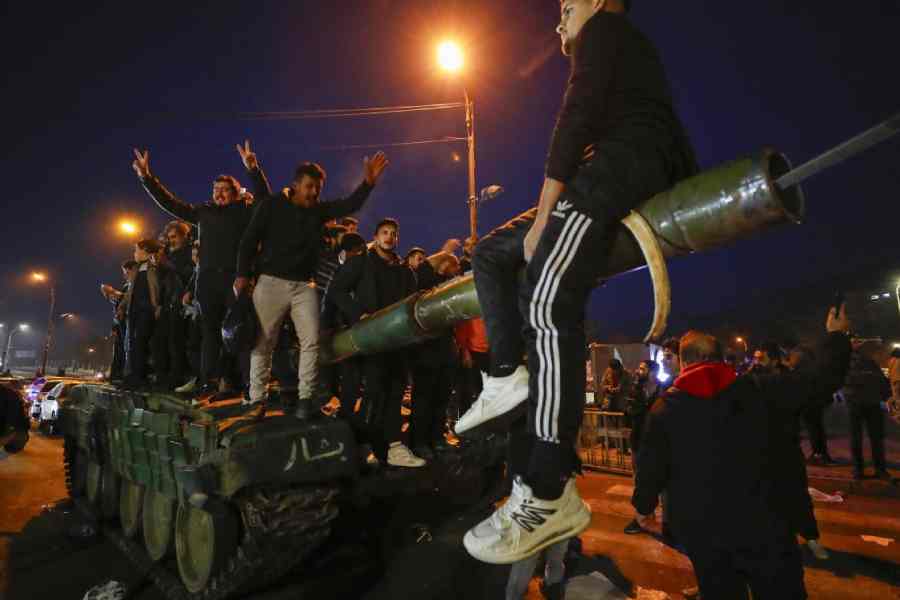President Bashar al-Assad has resigned and left Syria, Russia’s foreign ministry said on Sunday, a stunning fall for the longtime dictator that has ushered in hope and uncertainty after rebels opposed to his rule stormed across the country in a lightning offensive.
Assad’s departure is an earthshaking moment in the history of Syria, which has been ruled by his family with an iron fist since the early 1970s. It marks a dramatic breakthrough for rebel factions in Syria that have been trying to unseat Assad for more than a decade, much of it marked by a devastating civil war.
Russian state media outlets, citing anonymous sources, reported that Assad had arrived in Moscow on Sunday evening along with his family and had been granted asylum. There was no immediate comment from the Syrian presidency about Assad.
Syrians poured into streets echoing with celebratory gunfire on Sunday after the rebel advance reached the capital, Damascus, putting an end to the Assad family’s 50 years of strongarm rule but raising questions about the future of the country and thewider region.
Joyful crowds gathered in central squares in Damascus, waving the Syrian revolutionary flag in scenes that recalled the early days of the Arab Spring uprising, before a brutal crackdown and the rise of an insurgency plunged the country into anearly 14-year civil war.
Others gleefully ransacked the presidential palace and the Assad family residence.
Abu Mohammed al-Golani, a former al Qaida commander who cut ties with the group years ago and says he embraces pluralism and religious tolerance, leads the biggest rebel faction and is poised to chart the country’s future direction.

An Opposition fighter steps on a broken bust of the late Syrian president Hafez Assad, father of Bashar al-Assad, in Damascus on Sunday. AP
The end of Assad’s rule deals a major blow to Iran and its allies, already weakened by over a year of conflict with Israel. Iran, which had strongly backed Assad throughout the civil war, said Syrians should decide their country’s future “without destructive, coercive, foreign intervention”.
Prime Minister Benjamin Netanyahu said Israeli troops had seized a buffer zone in the Golan Heights dating back to 1974 after Syrian troops abandoned their positions in the latest unrest.
Suspected Israeli airstrikes hit Mazzeh district of Damascus on Sunday, one Lebanese and one Syrian security source said. Additionally, jets believed to be Israeli bombed the Khalkhala airbase in southern Syria that had been evacuated by the Syrian army overnight, two regional security sources told Reuters.
The rebels now face the daunting task of healing bitter divides in a country ravaged by war and still split among different armed factions. Turkey-backed Opposition fighters are battling US-allied Kurdish forces in the north, and the Islamic State group is still active in some remote areas.
Syrian state television aired a video statement early on Sunday by a group of rebels saying Assad had been overthrown and all prisoners set free. They called on people to preserve the institutions of “the free Syrian state”. The rebels later announced a curfew in Damascus from 4pm to 5am.
The rebels said they had freed people held at the notorious Saydnaya prison, where rights groups say thousands were tortured and killed. A video circulating online purported to show rebels breaking open cell doors and freeing dozens of female prisoners, many of whom appeared shocked and confused. At least one small child could be seen among them.
Rebel commander Anas Salkhadi, who appeared on State TV later in the day, sought to reassure Syria’s religious and ethnic minorities, saying: “Syria is for everyone, no exceptions. Syria is for Druze, Sunnis, Alawites, and all sects.”
He added: “We will not deal with people the way the Assad family did.”
Residents of Damascus gathered to pray at mosques and to celebrate in the squares, chanting “God is great”. People also chanted anti-Assad slogans and honked car horns. Teen boys picked up weapons that had apparently been discarded by security forces and fired them in the air.
Revellers filled Umayyad Square in the city centre, where the defence ministry is located. Men fired celebratory gunshots into the air and some waved the three-starred Syrian flag that predates the Assad government and was adopted by the revolutionaries.
“I cannot express my happiness,” said Bassam Masr. “But this happiness will not be complete until I can see my son out of prison and know where he is. I have been searching for him for two hours. He has been detained for 13 years.”
Soldiers and police officers left their posts and fled, and looters broke into the defence ministry.
A statement from the Alawite sect — to which Assad belongs and which has formed the core of his base — called on young Syrians to be “calm, rational and prudent and not to be dragged into what tears apart the unity of our country”.
The rebels mainly come from the Sunni Muslim majority in Syria, which also has sizable Druze, Christian and Kurdish communities.
Syrian Prime Minister Mohammed Ghazi Jalali said in a video statement that the government was ready to “extend its hand” to the Opposition and turn its functions over to a transitional government. A video shared on Syrian Opposition media showed a group of armed men escorting him out of his office and to the Four Seasons hotel on Sunday.
Rami Abdurrahman of the Syrian Observatory for Human Rights told The Associated Press that Assad took a flight on Sunday from Damascus.
Assad has been accused of war crimes and crimes against humanity during the war, including a 2013 chemical weapons attack on the outskirts of the capital.
The rebels are led by the Hayat Tahrir al-Sham group, or HTS, which has its origins in al Qaida and is considered a terrorist organisation by the US and the UN.
Its leader, al-Golani, has sought to recast the group as a moderate and tolerant force. HTS set up a “salvation government” in 2017 to administer a large region in northwestern Syria under its control.
“Golani has made history and sparked hope among millions of Syrians,” said Dareen Khalifa, a senior adviser with the International Crisis Group and an expert on Syrian groups. “But he and the rebels now face a formidable challenge ahead. One can only hope they rise to the occasion.”
The UN’s special envoy for Syria, Geir Pedersen, called for urgent talks in Geneva to ensure an “orderly political transition”.
Qatar, a key regional mediator, hosted an emergency meeting of foreign ministers and top officials from eight countries with interests in Syria. The participants included Iran, Saudi Arabia, Russia and Turkey.
Qatar’s top diplomat, Sheikh Mohammed bin Abdulrahman Al Thani, criticised Assad for failing to take advantage of the lull in fighting in recent years to address the country’s underlying problems.











